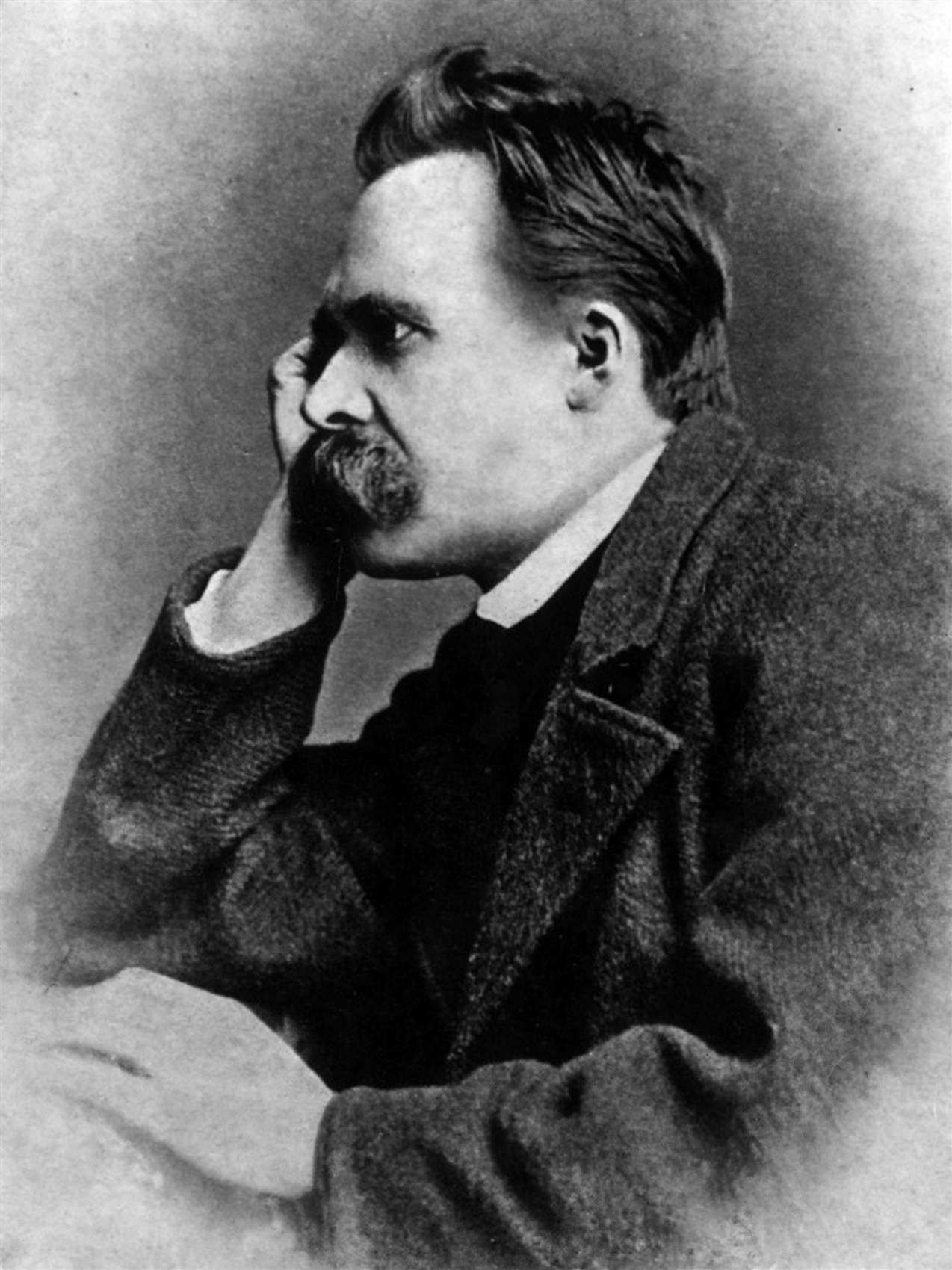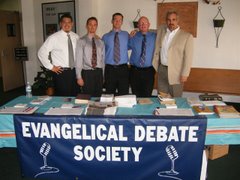Message Given on Sunday Evening, June 11, 2006 at
DC Fellowship Church, Moreno Valley California
by Ed EnochsChairman,The Evangelical Debate SocietyOver the past several months I have grown to love this church, and I greatly appreciate all the support you have given Pastors Mike, Gabe and I in coming out to our debates we have held against the Unitarians.
I would like to invite you out to my home church, Calvary Chapel Saving Grace this Friday night, June 16 at 7:00pm as Pastor Mike, Joel Hughes and I debate three Biblical Unitarians on the Doctrine of the Trinity.
The subject of apologetics, or defending the Christian faith is something that has consumed by life for the last twenty years.
I grew up in an unbelieving home and became a Christian on the University of Michigan Campus after I was given books by CS Lewis and Josh McDowel, giving evidence on why the Christian faith was true.
Since that time twenty years ago, I have dedicated my life to defending the Christian faith against ideological attack and to giving answers to demonstrate why Christianity is true.
The term Apologetics, or giving a reasoned defense of the Christian world view is taken from the Greek world, Apologia which means to give a reasoned verbal defense for something. Or to give a reasoned statement or argument.
Thus the term apologia of a formal defense of a cause or of one's beliefs or actions (from the
Latin apologia, from the
Greek "apo" and "logos").
The term is used in classical antiquity in the instance of the Apology (of Socrates)
Plato's version of the
speech given by
Socrates as he defends himself against the charges of being a man "who corrupted the young, did not believe in the
gods, and created new deities".
In 1 Peter 3:15 we also find the Greek term Apologia used, the English Standard Version reads,
But in your hearts regard Christ the Lord as holy, always being prepared to make a defense to anyone who asks you for a reason for the hope that is in you”
The term apologia is also used in Acts 22:1
Acts 22
1"Brothers and fathers, hear the defense that I now make before you."
Acts 25:16
I answered them that it was not the custom of the Romans to give up anyone before the accused met the accusers face to face and had opportunity to make his defense concerning the charge laid against him
1 Corinthians 9:3
This is my defense to those who would examine me.
Philippians 1:7
It is right for me to feel this way about you all, because I hold you in my heart, for you are all partakers with me of grace, both in my imprisonment and in the defense and confirmation of the gospel.
Philippians 1:16 Paul writes,
The latter do it out of love, knowing that I am put here for the defense of the gospel.
2 Timothy 4:16
At my first defense no one came to stand by me, but all deserted me. May it not be charged against them!
John Frame, professor of Apologetics at Reformed Theological Seminary in his book entitled, “Apologetics for the Glory of God” distinguishes the three facets of Apologetics:
1. Proof: presenting a rational basis for faith.
2. Defense: Answering objections to unbelief.
3. Offense: Exposing the foolishness of unbelieving thought.
The late Presuppostionalist Apologists Dr. Cornelius Van Til and Greg Bahnsen agure that among the functions of Biblical Apologetics is to.
1. Demonstrate the validity of the Christian worldview and truth claims.
2. To demonstrate the futility of all non Christian worldviews and that all non-Christian world-views will breakdown as being erroneous and self-contradictory as they are shown to contradict the Bible’s revealed teachings.
Again, in the Book of Acts we see the Apostle Paul engaged in the task of Apologetics throughout the book,
Acts 9:22 says,
Saul increased the more in strength and confounded the Jews that dwelt at Damascus, proving that Jesus is the Messiah.
Acts 17:2 says,
As his custom was, Paul went into the synagogue, and on three Sabbath days he reasoned with them from the Scriptures
Acts 17:17 says,
So he reasoned in the synagogue with the Jews and the God-fearing Greeks, as well as in the marketplace day by day with those who happened to be there, [including] certain Epicurean and Stoic philosophers.
Acts 18:4 says,
Every Sabbath Paul reasoned in the synagogue, trying to persuade Jews and Greeks.
Acts 19:8-9 says,
Paul entered the synagogue and spoke boldly there for three months, arguing persuasively about the kingdom of God... [and later] reasoning daily in the school of Tyrannus.
It is necessary to defend the Christian Faith in order to give non-Christians Biblical reasons why the Christian faith in true and to guard the Church against the heresies of false prophets and false teachers that rise up in and outside the church time after time again.
1 Thessalonians 5:21 says, “to test all things, to hold fast to the truth”
1 John 4:1 tells us to test the spirits whether they be of God, for many false teachers have gone out into the world.
Jesus Christ said, “Beware of false prophets who come to you in sheeps clothing, but inwardly they are ravenous worlves.
In Acts chapter 20, the Apostle Paul warns the Church in Ephesus,
I know that after my departure fierce wolves will come in among you, not sparing the flock; and from among your own selves will arise men speaking twisted things, to draw away the disciples after them. Therefore be alert, remembering that for three years I did not cease night or day to admonish everyone with tears.
Paul also said in 2 Timothy 4:1-5
I charge you therefore before God and the Lord Jesus Christ, who will judge the living and the dead at His appearing and His kingdom: Preach the word! Be ready in season and out of season. Convince, rebuke, exhort, with all longsuffering and teaching. For the time will come when they will not endure sound doctrine, but according to their own desires, because they have itching ears, they will heap up for themselves teachers; and they will turn their ears away from the truth, and be turned aside to fables. But you be watchful in all things, endure afflictions, do the work of an evangelist, fulfill your ministry.
Throughout the entire history of the Christian Church, we have had to guard ourselves against the doctrines of false teachers.
In the First century, the early church had to defend itself against the heretical teaching of the judiazers mentioned in books such as Galatians and hebrews, who tried to force jewish converts to Christianty back under the jewish law and attempted to force them to practice unbiblical rules and regulations that are contrary to Scripture such as circumscion and adhering to certain dietary laws.
The Church in the first few centuries also had to deal with the heresies known as Gnosticism and Docetism.
The Gnostics were a early heretical cult that taught that they alone were initiated into the true “knowledge” or gnosis, and they tought the heretical view that since all matter is evil, Jesus Christ could not have taken on an actual human body, but only appeared to take on a body, but was in actuality a hologram that appeared as the form of Christ.
The term
Docetism (from the
Greek δοκέω [dokeō], "to seem") is the belief that
Jesus' physical body was an illusion, as was his
crucifixion; that is, Jesus only seemed to have a physical body and to physically die, but in reality he was incorporeal, a pure spirit, and hence could not physically die.
In the Second Century, the Patristic followers, the immediate leades of the Christian Church after the passing of the Apostles, had to deal with the Gnostics as well as the heresies of the false teachers Marcion
Marcion and his followers-
Heretical sect founded in A.D. 144 at Rome by Marcion and continuing in the West for 300 years, but in the East some centuries longer, especially outside the Byzantine Empire. They rejected the writings of the Old Testament and taught that
Christ was not the
Son of the
God of the Jews, but the Son of the good God, who was different from the God of the Ancient Covenant. They anticipated the more consistent dualism of Manichaeism and were finally absorbed by it. As they arose in the very infancy of
Christianity and adopted from the beginning a strong ecclesiastical organization, parallel to that of the Catholic Church,
The early apologists,
Justin the Martyr,
Tertullian, and Irenaeus all wrote apologetical works against Marcion and his Followers as well as wrote works against the Pagan Platonic opponent of early Christianity named Celsus.
Celsus the Platonist was a polemical writer against
Christianity, who flourished towards the end of the second century. he wrote a work entitled "The True Discourse" against the
Christian religion.
Celsus's work may be divided as follows: a preface, an attack on
Christianity from the point of view of Judaism, an attack on
Christianity from the point of view of philosophy, a refutation of
Christian teachings in detail, and an appeal to
Christians to adopt paganism.
In the fourth century the Arian Controversy caused a young man named Athanasius to write a work on apologetics entitled the Incarnation of the Word against Arius who denied the doctrine of the Deity of Christ and argued that Jesus Christ was not God but was rather a created being, much like the Jehovah’s Witnesses teach today.
About a hundred years later, the major theologian Augustine of Hippo wrote works against the Pelagians and the Donantists.
Throughout the history of the Church the church has been attacked from within and from without and Christians have had to defend the Christian faith against the false teachings of the heretics.
In our own day there are many opponents of Christianity that are attacking the Christian Church such as the proponents of, Postmodernism evolution and secular humanism. Atheists and agnostics aganst the church are abounding.
There are also cults flourishing across America that are making millions of disciples. Cults such as the Mormons and Jehovah’s Witnesses are making converts at an alarming rate.
We must be like the apostle Paul and defend the Christian faith against all oppostion for the glory of God.
The Doctrine of the Trinity is true.
Jesus Christ is God.
The Bible is true.
This is why we defend the Christian faith all for the glory of Almighty God!
Jesus Christ is God in human flesh, He died on the cross and rose again from the dead in order to give eternal life to all those who repent of their sins and place their faith in Him.
"But these have been written that you might believe that Jesus is the Christ, the Son of God and that by believing you might have life in His name" (John 20:31).

















